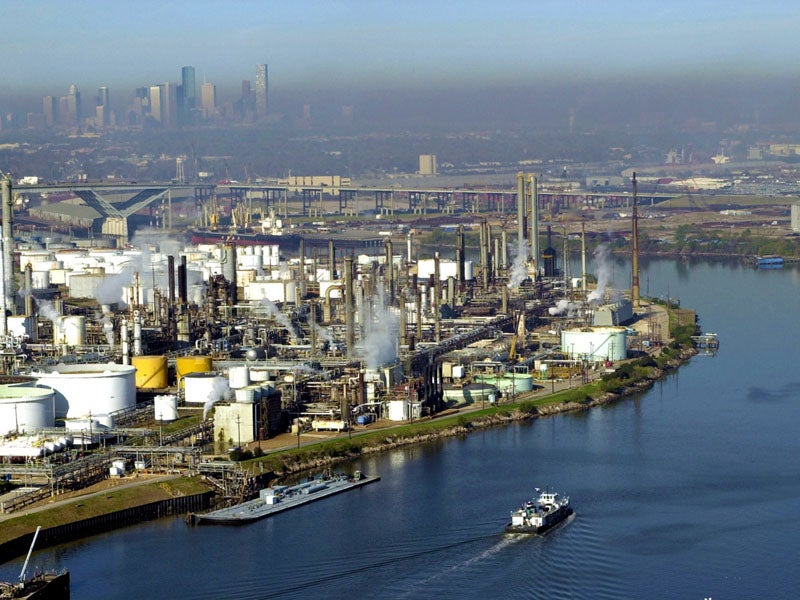Taking Exxon to Court to Protect Clean Air (and Winning Big)
In a $20 million victory for public health, a citizen suit made ExxonMobil pay for violating the Clean Air Act at a facility near Houston.

This page was published 8 years ago. Find the latest on Earthjustice’s work.
Anyone who thinks that ordinary citizens can’t do much to stand up to a fossil fuel giant in the heart of oil country has just been proven wrong.
When ExxonMobil violated important health protections under the Clean Air Act at its refinery and chemical complex in Baytown, Texas, state officials gave them a sweetheart deal. But the Baytown neighbors who suffered years of poor air quality and severe local smog didn’t back down. They testified in court to help win a lawsuit brought by environmental groups that eventually forced the company to pay nearly $20 million in penalties.
Environment Texas and the Sierra Club sued the oil giant using the Clean Air Act’s “citizen suit” provision, which allows people harmed by pollution to hold corporations accountable for violating clean air standards and permits.
When the trial court initially ordered no remedy at all despite thousands of Clean Air Act violations, the environmental groups appealed to the U.S. Court of Appeals for the Fifth Circuit. The appeal resulted in a precedent-setting victory. The Fifth Circuit remanded the case to the trial court, which in late April reversed its original decision and ordered what is believed to be the largest-ever penalty imposed in an environmental citizen suit. The ruling is likely to deter other violations of the Clean Air Act because this decision can be cited by other courts considering similar cases – and you can be sure the fossil fuel industry knows that.
“This ruling shows how crucial the citizen enforcement provision of the Clean Air Act really is for Texas residents,” said Luke Metzger, Director of Environment Texas, in a press release. “It means that private citizens victimized by the world’s biggest polluters can get justice in the American court system, even when government regulators look the other way.”
“[This ruling] means that private citizens victimized by the world’s biggest polluters can get justice in the American court system, even when government regulators look the other way.”
The ruling is also expected to improve compliance at hundreds of refineries, chemical and other polluting facilities along the sprawling Houston Ship Channel, where the state has too often ignored violations or issued weak, ineffective fines amounting to little more than traffic tickets for large corporations. This is critical in Houston because the Ship Channel has the largest concentration of oil refineries and chemical plants in the nation and air pollution can travel miles away to cause health concerns throughout the region.
Several organizations helped shepherd the case to victory. The National Environmental Law Center represented Environment Texas and the Sierra Club in court, along with attorney David Nicholas of Newton, Massachusetts, and Houston attorneys Philip Hilder and Will Graham. On appeal, Earthjustice filed a friend-of-the-court brief on behalf of a local community group, Air Alliance Houston, in concert with the University of Texas-Austin Environmental Law Clinic. The City of Houston and Harris County Attorney Vince Ryan joined this amicus brief in support of clean air enforcement.
During the two-week trial, four individuals testified about their personal experiences living near the Baytown Complex, describing how they have been exposed to foul odors, poor air quality, and the fear that each massive flaring event at Exxon could signal a potential explosion.
The trial judge found that, while committing 16,386 violations, Exxon profited by over $14 million from delaying the implementation of necessary pollution control measures.
The trial judge found that, while committing 16,386 violations, Exxon profited by over $14 million from delaying the implementation of necessary pollution control measures. The company let the Baytown refinery and chemical complex spew 10 million pounds of carcinogens, ozone-forming chemicals, respiratory irritants and other toxic pollutants into the air, endangering the health of the tens of thousands of people in the region. Ozone levels are notoriously high near Baytown with ozone-forming chemicals often affecting air pollution miles away in the Houston area. Studies show that ozone is especially dangerous for people with asthma, and can cause serious respiratory problems and even death.
The Clean Air Act is designed to protect public health, especially in places like the Houston area that have unsafe levels of pollution. The law’s citizen-suit provision recognizes that people exposed to and hurt by pollution have the greatest interest in making sure environmental laws are enforced to protect their health and safety. And as this victory shows, people need the chance to stand up for their rights in a court of law.
“Everyone who cares about clean air must be vigilant in protecting the basic right to go to court as a fundamental American value.”
“Everyone who cares about clean air must be vigilant in protecting the basic right to go to court as a fundamental American value,” said Earthjustice attorney Emma Cheuse. “Sometimes that’s the only way to win justice when the government fails to protect public health, or a large corporation decides to put profits ahead of controlling toxic pollution.”
There is much more work that needs to be done to protect communities around the country like Houston from toxic pollution. As we face a presidential administration and Congressional majority who don’t always prioritize health and the environment, citizen-suit provisions will continue to be essential safeguards in ensuring that all Americans can breathe clean air and drink clean water.
Earthjustice’s Washington, D.C., office works at the federal level to prevent air and water pollution, combat climate change, and protect natural areas. We also work with communities in the Mid-Atlantic region and elsewhere to address severe local environmental health problems, including exposures to dangerous air contaminants in toxic hot spots, sewage backups and overflows, chemical disasters, and contamination of drinking water. The D.C. office has been in operation since 1978.